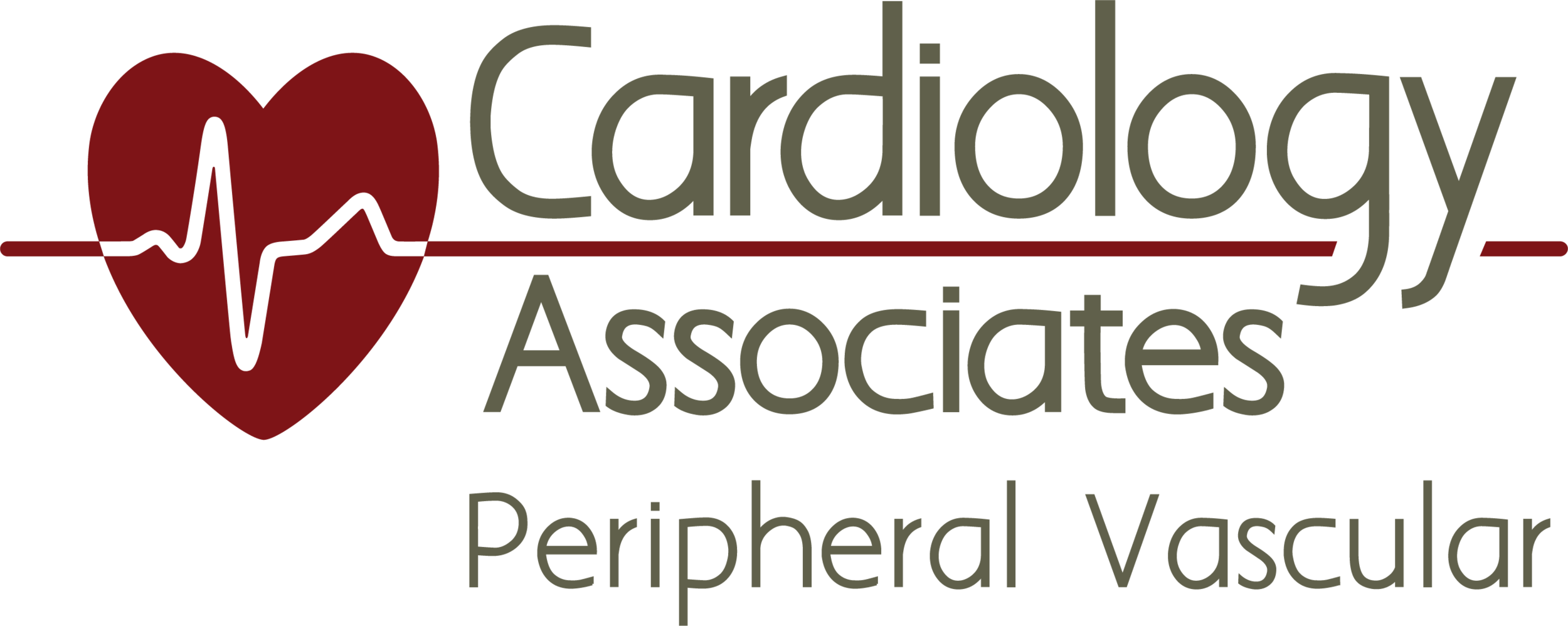Narrowing or blockages in the arteries does not only occur in the heart with the development of coronary artery disease (CAD). These type of blockages can also develop in the peripheral arteries and if known as peripheral vascular disease (PVD) or peripheral artery disease (PAD). The peripheral arteries carry vital oxygen-rich blood out to the legs, arms and other areas in the body. When PVD develops it can be a serious circulatory problem and can put patients at significant risk of heart attack, stroke, limb amputation or even death.
One in 20 people over the age of 55 have PVD, and a large majority of those affected with PVD are not aware they have it. PVD can cause leg discomfort with walking, poor healing of leg sores, development of ulcers, difficulty controlling blood pressure, or symptoms of stroke. Prevention and detection of PVD/PAD can save lives, limbs as well as keep one active and healthy.
Cardiology Associates is committed to providing the residents of the Gulf Coast region access to the most up-to-date peripheral vascular care offering specialized diagnosis and treatment for patients with PVD. Our experienced team provides comprehensive evaluation and treatment to patients with PVD. Nine of our cardiologists are fellowship trained in peripheral vascular intervention and have over 75 years of combined experience and outcomes in treating PVD. Cardiology Associates also participates in national clinical trials related to peripheral vascular treatment and intervention.
What are symptoms of Peripheral Vascular Disease?
Peripheral Vascular Computed Tomography image
Cramping or tiredness in the leg muscles when walking or exercising, that is relieved by resting
Numbness or weakness in the extremities (legs, arms or feet)
Coldness in the feet or lower leg, especially if isolated to one side
Sores on the feet or legs that will not heal
Erectile dysfunction in men
What are the risk factors for Peripheral Vascular Disease?
Over age of 50
Family history or personal history of vascular disease, such as heart disease, stroke or aneurysm
High cholesterol and / or high lipid blood test
Diabetes
Those who currently smoke or are a former smoker
Inactive lifestyle
High blood pressure / hypertension
How is Peripheral Vascular Disease diagnosed?
A common test for diagnosis of PVD/PAD is an ankle brachial index (ABI) of the lower extremities. This pressure index test compares the ratio of the blood pressure in the ankle versus the upper arm. If lower blood pressure in the legs than the arm is indicated, this can be an sign of narrowing or blockages peripheral arteries and further testing may be recommended. A CT scan or peripheral angiography may be performed.
How is Peripheral Vascular Disease treated?
When a patient is treated for PVD interventional cardiologists will perform balloon angioplasty and/or deploy a stent to open the blocked artery. This a minimally invasive procedure performed in the cath lab under conscious sedation. PVD patients soon notice the relief of symptoms as blood flow restored, thus improving their quality of life and ability to walk longer distances.
Our Peripheral Vascular Specialists
Brian D. Dearing, MD, FACC, FSCAI
Clinical & Interventional Cardiology
Peripheral Vascular Intervention
John F. LeDoux, MD, FACC
Clinical & Interventional Cardiology
Peripheral Vascular Intervention
Request an Appointment
If you need immediate medical assistance, please call 9-1-1. We cannot accept emergency requests through this online appointment form.
We know how important it is for you to get your appointment scheduled promptly. To schedule an appointment, please call 251-607-9797 Monday through Friday from 8:00 a.m. to 5:00 p.m. or complete the form below. A representative will contact you within 24 hours or the following business day to schedule your appointment
If you are an established patient of Cardiology Associates, you may also request an appointment online through our Patient Portal. In the portal, you can also request a prescription refill, submit questions and provide updated information.
We understand schedules can change so should you need to reschedule or cancel your scheduled appointment, please call at least one day in advance so we can give your time to another patient. If due to unforeseen circumstances, you cannot give 24 hours’ notice, please call as soon as you know you will be unable to keep your appointment. If you miss an appointment for any reason, please do not come into the office without first rescheduling another appointment.









